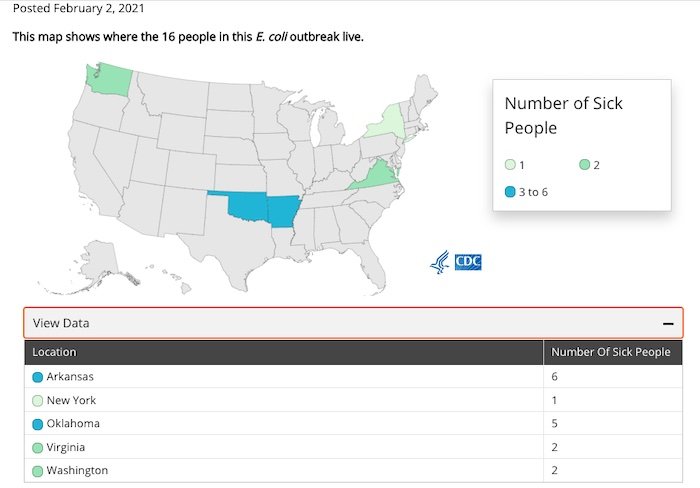A five-state E. coli outbreak is causing unusually severe infections including nine hospitalizations and one death, according to the Centers for Disease Control and Prevention (CDC). Three people have a form of kidney failure associated with E. coli infections called hemolytic uremic syndrome (HUS).
Investigators have not yet identified the exact food source but they have determined through the use of genetic tests that the outbreak strain has been linked to previous E. coli outbreaks including ground beef, recreational water, a 2018 outbreak linked to romaine lettuce that killed five people and a deadly 2020 E. coli outbreak where leafy greens were a suspected source. In the 2018 and 2020 outbreaks, several of the people sickened reported eating at the same restaurant and had eaten multiple common food items.
This outbreak includes 16 people, ranging in age 10 to 95, who developed symptoms of an E. coli infection on dates ranging from December 23, 2020, to January 7, 2021. Eighty-eight percent are female. Nine of the 16 patients were so sick they required hospitalization.

“The hospitalization rate of this outbreak is almost twice the average,” said noted E. coli Attorney Eric Hageman. “The hospitalization rates for the 2018 and 2020 outbreaks caused by the same strain were also unusually high.
The number of cases reported from each state is: Arkansas (6), New York (1), Oklahoma (5), Virginia (2), and Washington (2). The death was reported in Washington.
Whole genome sequencing (WGS), which identifies the genetic “fingerprint” of a bacteria, was used to discover this outbreak. These fingerprints are then uploaded to a national database managed by the CDC. Matching fingerprints indicate that people who got sick likely ate the same food.
Symptoms of an E. coli infection usually develop one to five days after exposure and include abdominal cramps and diarrhea that can be bloody. The CDC is urging anyone with the following symptoms to seek immediate medical attention:
- Diarrhea and a fever higher than 102°F.
- Diarrhea for more than three days that is not improving
- Bloody diarrhea
- So much vomiting that you cannot keep liquids down
- Signs of dehydration, such as dry mouth or throat, feeling dizzy when you stand up, not urinating (peeing) much.
CDC is also asking anyone who has these symptoms to help solve the outbreak by doing the following:
- Write down what you ate in the week before you got sick.
- Report your illness to your local or state health department.
- Answer public health officials’ questions about your illness.
 .
.
If you recently developed an E. coli O157:H7 infection from contaminated food and would like a free consultation with an experienced E. coli lawyer, please contact the Pritzker Hageman E. coli Legal Team. We have represented clients in every major E. coli outbreak in the U.S. including those who battled HUS and families who suffered the wrongful death of a loved one. You can reach us by calling 1-888-377-8900, sending a text to 612-261-0856, or by completing the form below. There is no obligation and we don’t get paid unless we win.
